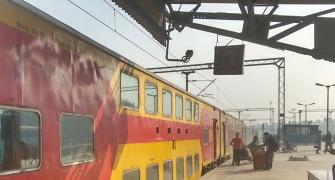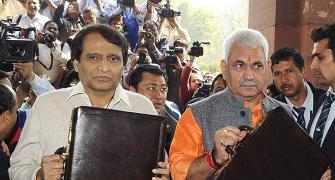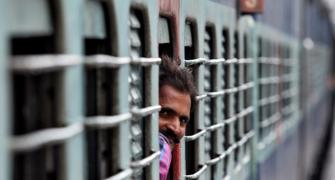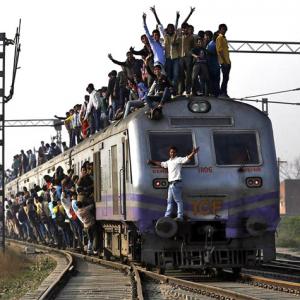The railway minister has steered clear of populist traps and refrained from making grandiose announcements in terms of new trains and new rail routes. He should now emulate China, and rope in Japan in boosting the rail network, says Rajeev Sharma.
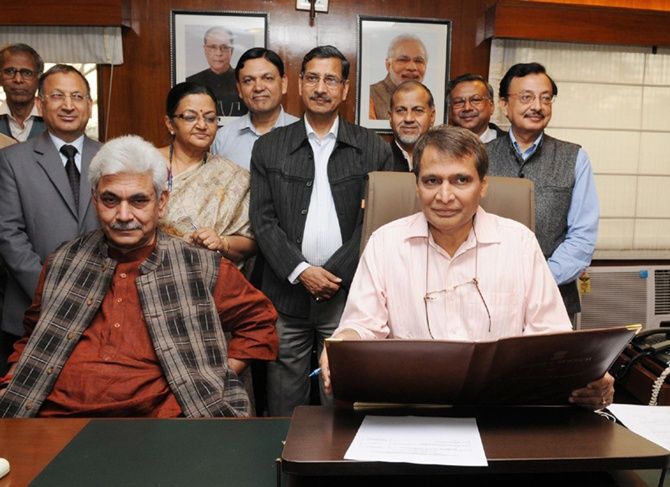
Suresh Prabhu has indeed presented a pragmatic rather than a populist Rail Budget with a laser beam focus on boosting the long-neglected new rail network and arranging much-needed finances for doing so.
But the railway minister requires to do two things in double quick time:
1. Closely study the stupendous achievements of China and see where Chinese cooperation can be had without jeopardising national security;
2. Rope in Japanese, Korean and Western companies in taking Indian Railways to a new level with Indo-Japan cooperation in Delhi Metro Rail Corporation as the role model.
China has shown the world what magical results a development-focused nation can produce in boosting and improving its rail network consistently over decades. India boasted of a huge lead over China at the time of independence in terms of total track length which was double that of China's. Of course, it was a British legacy and the Britishers had created a massive rail network in the entire Indian subcontinent, solely to ensure its iron grip over governance.
But the Chinese started changing this template since almost four decades ago, particularly after China started its economic reforms in December 1978. From having half the size of its rail track length almost seven decades ago, China today boasts of 150 percent of India's. The total track length in India today is 65,000 km while the figure for China is 1,12,000 km.
The onset of coalition politics era in India since 1989 led to an epic neglect of railway infrastructure as each railway minister since then used railways as a political tool and every rail budget has been populist with mountains of promises in terms of new trains and new rail routes but most of these promises remained on paper only. Suresh Prabhu has steered clear of this populist trap and refrained from making grandiose announcements in terms of new trains and new rail routes.
The interesting thing about how China raced past India in rail infrastructure is clear from the fact that in the past 15 years alone, it has added almost 22,000 km of rail network which is twice of what India has added since independence in 1947.
Moreover, China today boasts of a massive bullet train network of about 12,000 km as against zero in India. This too when China doesn't even have a separate railway ministry and India is the only country in the world with an annual practice of having a separate rail budget!
Something is clearly amiss. Each rail minister for decades has been parochial and routinely announced new rail lines, extension of existing lines and big ticket projects benefitting his/her state and parliamentary constituency. It is indeed a welcome change that Suresh Prabhu has done none of that and focused on arranging finances to turn the railways around.
In this context, his decision of roping in the financial giant, Life Insurance Corporation for loan of 1.5 lakh crore (about $22 billion) over the next five years on “reasonable terms” is laudable, though one would have wished for more details of this potential game-changer arrangement.
One good thing about Suresh Prabhu’s rail budget 2016-17 is that it is looking ahead over the next five years and is laying a special focus on infrastructure development in a sustained manner over the next five years.
Suresh Prabhu will do well to study the Chinese model of railway infrastructure development. China has long conveyed its keenness to wade into the Indian railway sector in a big way both in terms of massive investments and technical expertise. The previous United Progressive Alliance government had seriously examined the Chinese offer but had to eventually ignore it after the security agencies red-flagged the Chinese proposal.
This situation hasn't changed today also. The Indian security establishment doesn't want to involve Chinese companies in the rail sector because in such an eventuality China will soon know the signalling and communication codes which in case of a war can be dangerous as China can then bring the entire Indian rail network to a halt.
India can still emulate China without involving Chinese companies. A better and more effective option is to involve countries like Japan, South Korea, Germany, France and the United Kingdom in bolstering and modernising Indian Railways. DMRC has been a shining example and Japan has demonstrated its capability by giving Delhi a world class metro train network.
The writer is an independent journalist and a strategic analyst who tweets @Kishkindha.

